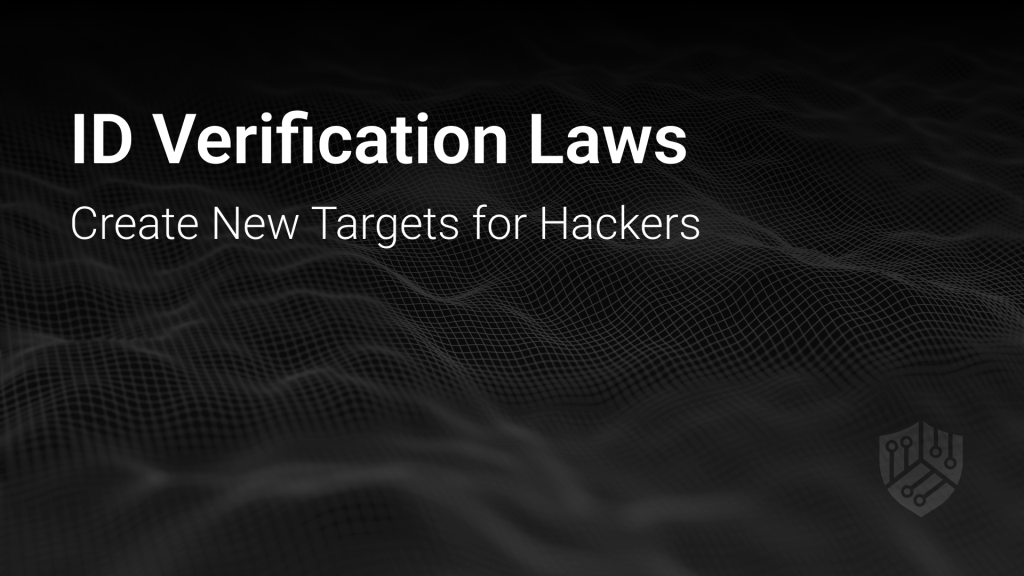November 14, 2025
ID Verification Laws Create New Targets for Hackers

Well-intentioned legislation designed to protect children online is inadvertently creating a cybersecurity nightmare. As governments worldwide mandate stricter age verification requirements, they’re forcing companies to amass unprecedented collections of the most sensitive personal data imaginable: government-issued IDs, passport images, and biometric facial scans. The result? Digital identity security has become the next major battleground for cybercriminals and cybersecurity providers.
The Discord Breach: A Warning Shot
In October 2025, Discord disclosed that hackers compromised one of its third-party customer service providers, exposing government ID images from approximately 70,000 users who had contacted support or appealed age-related account restrictions. This breach exposed personally identifiable information (PII) that criminals can use to commit fraud for years to come.
Discord did not choose to collect these IDs. Increasingly strict age verification laws around the world now require platforms to verify users’ ages, forcing them to gather and store large amounts of PII regardless of whether they have sufficient security measures. When child protection laws intersect with weak cybersecurity, the result is often personal data being exposed on a massive scale.
The ID Honeypot Problem
Traditional cybersecurity wisdom advises collecting minimal data on the principle that you can’t lose what you don’t have. But when governments compel platforms, under threat of harsh penalties, to collect and store millions of personal identification documents, they’re essentially creating digital treasure troves for cybercriminals.
These centralised databases represent irresistible targets containing everything identity thieves need:
- full names
- addresses
- photos
- identification numbers
- birth dates.
The AU10TIX incident exemplifies this vulnerability. This identity verification company, used by major platforms including TikTok, X (formerly Twitter), and Uber exposed administrative credentials online for over a year, allowing unauthorised access to:
- names
- birth dates
- nationalities
- identification numbers
- uploaded ID images.
The company handles identity verification for some of the world’s largest platforms, yet failed to secure its own systems.
Beyond Digital: Real-World Consequences
The need for identity theft prevention extends beyond financial fraud. Leaked identification documents provide exactly what human traffickers need: photos, addresses, and personal details of potential victims. When someone’s identity and home address become public through a data breach, it enables stalkers and harassers to escalate their campaigns from digital spaces to physical threats.
Critics argue that collecting and storing personal data, such as government IDs, creates “honeypots” for hackers. Also, digital rights groups question whether these laws can achieve their stated goals when VPNs and identity forgery workarounds remain easily available. The legislation may drive users to less-regulated platforms while simultaneously creating massive security vulnerabilities.
The Regulatory Paradox
Discord and other platforms introduced stricter age verification measures to comply with laws, including:
- the UK’s Online Safety Act
- France’s Security and Regulation of the Digital Space law
- the EU’s Digital Services Act.
Yet compliance with these regulations directly conflicts with fundamental cybersecurity principles.
A government-issued photo ID has a sensitivity that even usernames and passwords do not. It represents a significant expansion in the collection of personally identifiable information, even by today’s privacy-unfriendly standards. Organisations now face an impossible choice: violate age verification laws or create massive security liabilities that undermine digital identity security.
The Call for Better Security Infrastructure
The proliferation of ID verification laws isn’t slowing down. Ohio’s law took effect on September 30, 2025, just days before Arizona enacted its own version. Meanwhile, Australia’s under-16 social media ban is set to begin on December 10, 2025.
As more jurisdictions implement these requirements, the volume of sensitive data circulating through digital systems will explode, immediately followed by cybercriminals’ attacks.
Organisations collecting this data must implement:
- enterprise-grade encryption both in transit and at rest
- access controls limiting who can view sensitive documents
- comprehensive monitoring to detect breaches quickly
- secure data retention policies and deletion procedures
Most critically, they need expertise. Identity theft prevention and identity fraud detection demand specialised knowledge that many organisations lack. The consequences of failure—regulatory penalties, litigation, reputation damage, and loss of customer trust—make professional cybersecurity support essential rather than optional.
Secure Your Identity Verification Systems with CyberFlow
Don’t let ID verification laws turn your organisation into the next data breach victim. CyberFlow specialises in protecting the sensitive customer data that your business is now required to collect and store.
Your customers trust you with their most sensitive information. That trust demands professional protection. Contact us today and let us protect your IT systems and customer data before the next breach makes headlines!
About Us
If you are interested on apply more security to your business contact us
